This is a response to the homeschooling article on PopSugar.com:
“What Homeschooling Gets Wrong About Socialization, According to a Former Teacher”
…from a former public school student/parent turned homeschool mom, daughter of a former public school teacher, and possibly the most introverted high school cheerleader ever to whisper into a megaphone.
Homeschooling & Socialization, A Perfect Conflict of Interest
First let me say, what an ingenious way to get your writing to go viral! Beat the drum of socialization on the internet now crawling with homeschooling parents.
Like poking a stick in a fire ant mound, this writer had a perfect plan to send an ever-growing population of homeschooling parents and bloggers scrambling in outrage and her article spreading like a grass fire.
And unfortunately it worked.
We have shared her unsupported opinions on our social media sites fast and furiously. And now we are the frantic ants trying to repair the damage to our carefully constructed mound of evidence proving homeschooling works.
Stop! Get back in your pajamas. Put down the pointy math manipulatives. Let’s all take a deep breath.
Absolutely no damage has been done to the homeschooling movement. Except the part where we all lost precious time worrying over the opinion of one individual. Nevertheless, I am devoting a bit of sleep and blog space to circle and fortify the ant hill.
This is cute: “…how will students learn how to socialize in the world if they’re isolated?”
Being A “Former” Anything Doesn’t Qualify One as an Expert
I have no intentions of attacking the writer of this article. She is as entitled to her opinion as I am entitled to believe it shallow and inexperienced. The key word being “opinion.” An opinion which I find holds little weight on the topic of homeschooling.
If she is ‘in fact’ a former teacher, then already she is more qualified to teach my children than I am, according to the US Department of Education. And as a former practicing, still currently licensed Physician Assistant, I am more qualified to determine the dietary needs of her toddler, according to the Board of Medicine.
But, it has been 13 years since I have formally practiced medicine and have never worked in pediatrics past the mandatory clinicals during my training. And so I do not consider it ethical to use my PA-C/MPH initials to belittle an entire set of the population who (let’s say hypothetically) choose to feed their kids a diet with which I do not agree.
It is misleading and devious to take an authority position on something you have little experience with and pass it off to the less knowledgeable public, just because…See my degrees! They say I know best.
Judging by her young and beautiful profile pictures, and the fact that she is the mother to one toddler, I dare say her former years spent as an educator were few, and her exposure to homeschooled children discernably fewer.
How Do You Research Homeschooling in a School Classroom?
So…um, where did she get her information? I’m still in search of her supporting data. Obviously she missed this little study [HERE] in her efforts to learn about homeschooling.
However she writes, “Having taught in public schools where I encountered students who had been homeschooled in the past, I can say that many of these students needed to make serious strides when learning how to adapt.”
So a few kids were sent to school for unknown reasons after an undetermined length of time homeschooling, and based on those three, five, or even ten individual cases she witnessed, she has determined that probably all homeschoolers are doomed to fail socially.
Now I don’t know how they teach the scientific method of developing a theory in public schools these days, but my unsocialized 4th and 7th graders know it takes a large amount of observable and reproducible data to postulate a theory.
I dare say that, like hunting for polar bears in the Sahara Desert, you would be hard up to find any successful homeschoolers in a public school classroom. Because of her unsupported claim of knowledge in the area of homeschooling, after reading her article I am left asking:
- Was she asked to substitute homeschool the neighbor’s kids?
- Did she spend a year of Mondays hanging out at a local co-op?
- Were there hundreds of homeschool families inviting her into their homes for an extended-stay teacher in-service?
- Did she attend college with mostly socially challenged, denim jumper wearing homeschoolers who didn’t pull their weight on the group projects?
She’s Right. Homeschooling Gets Socialization All Wrong
Socialization is the only argument left against homeschooling that holds any water. Even the writer admits, though without documented research, that “…most of [the homeschoolers she met] were at or above their designated grades as far as proficiency…”
However, homeschooled children are not getting the socialization that their public schooled counterparts are receiving. If you subscribe whole heartedly to the public school definition of socialization in an artificial setting of same aged peers day after day, then homeschool kids are getting it wrong and always will.
Duh! That is sort of the whole point.
Most of us homeschooling parents are not in the business to create “…People [who] show up, work near and with others who are different from and challenge them, collaborate, and go home.” As this former teacher points out, public school socialization produces good workers and citizens. Good followers.
Super.
We in the homeschool business are in it to produce leaders with original thoughts and the gumption to take the road less traveled uninhibited by the status quo.
Group think “day in and day out, with consistent peers” does not strengthen creative minds. Rather it keeps those minds between the lines, in the confines of the group and in the control of the strongest personalities controlling the group. And the strongest personality is rarely the most ingenuitive.
Many of histories most brilliant minds were introverts. Had they been forced to “consistently work with people they’re not used to working with” their ideas would have been drowned out. Susan Cain illustrates this point in her latest book “QUIET: The Power of Introverts in a World That Can’t Stop Talking.”
As a certified introvert I can attest that it took me years to get out from under my public school socialization and show the world what I was really thinking, what I could do if given the chance to do my own thing. And if I could go back in time, I would not hesitate to tell a few folks to earn their own ‘A’!
Wait. This From the Same Author that said…
Because the author of this biased opinion piece did not list any research supporting her views, I went hunting for evidence of her experience with homeschooled children in some of her other articles. I was not able to uncover any of her research into homeschooling. But what I did find made me smile. She is a first time young mom with an adorable toddler struggling, just like the rest of us, to do this parenting gig as right as we can.
Knowledge comes with experience. And we have all opened our mouth and inserted our foot a time or two. But other times we get it right.
Pearls of wisdom from Laurel Niedospial‘s other writings at PopSugar.com that I completely agree with:
“By removing the boundaries that are created by formal programs, children will grow to express themselves differently than they would have in a class.”
“Children are naturally divergent thinkers, so instead of expecting them to give some trite answer about what they want to be, maybe we can ask them think about the world differently.”
“It’s clear to me now that no decision is right for everyone, but it’s really easy for everyone to have an opinion.”
Relax everybody. Homeschooling is alive and well, and still completely lacking in institutionally recognized methods of socialization.
But would we have it any other way?

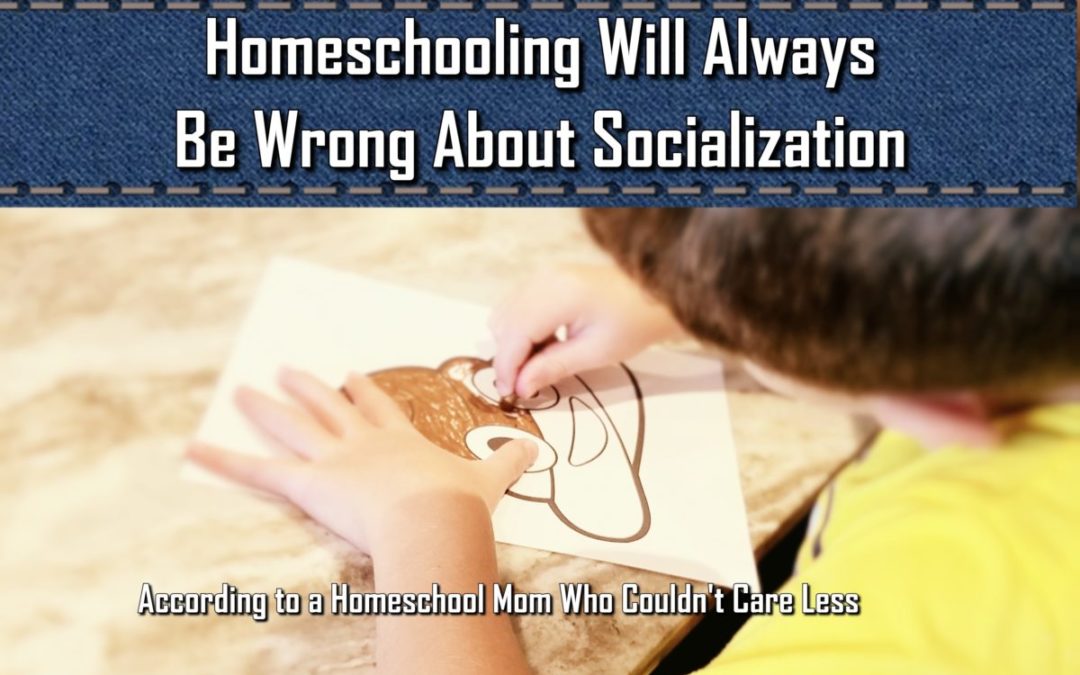
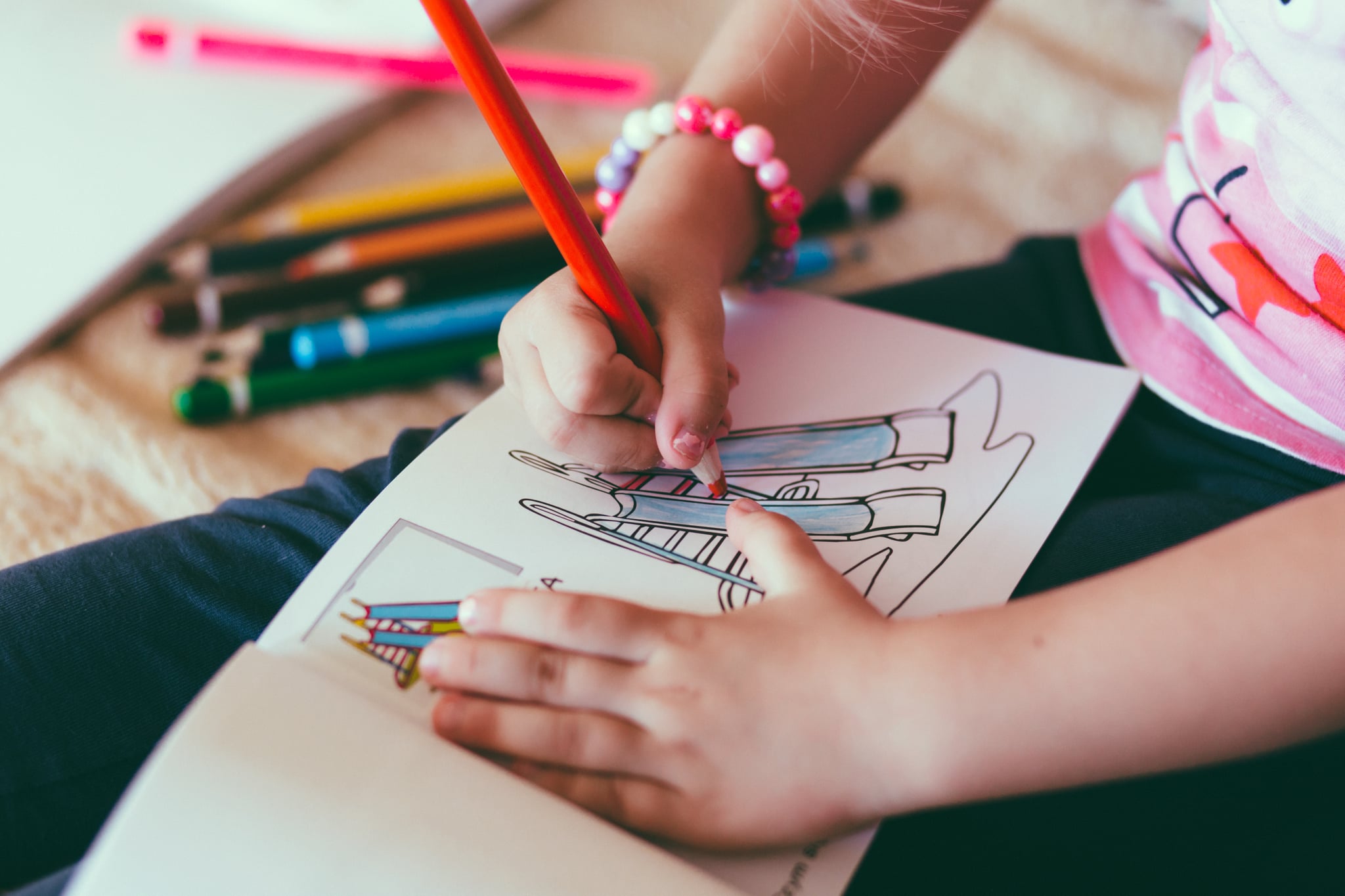
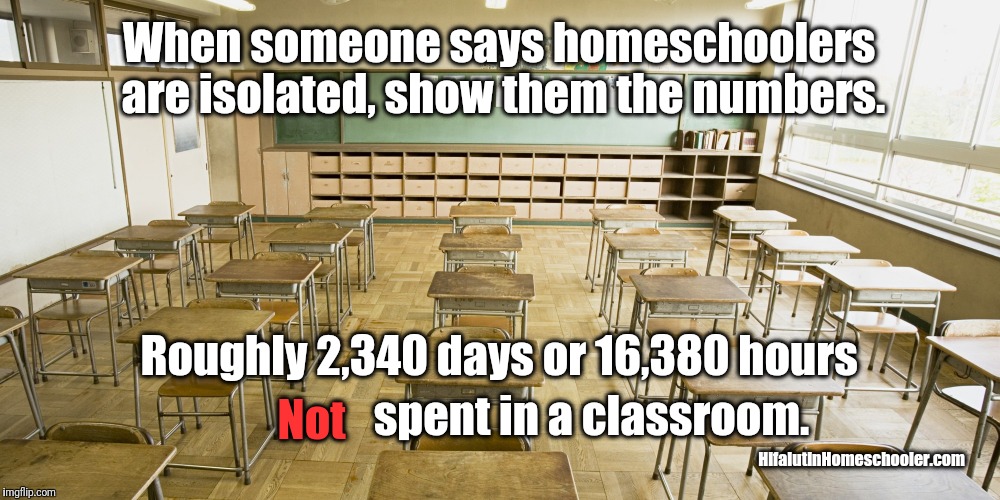
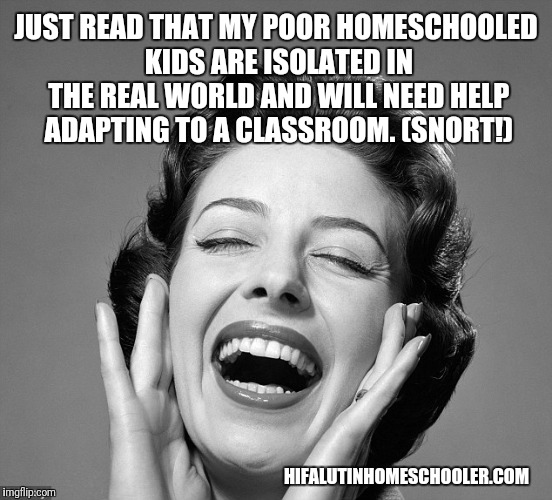
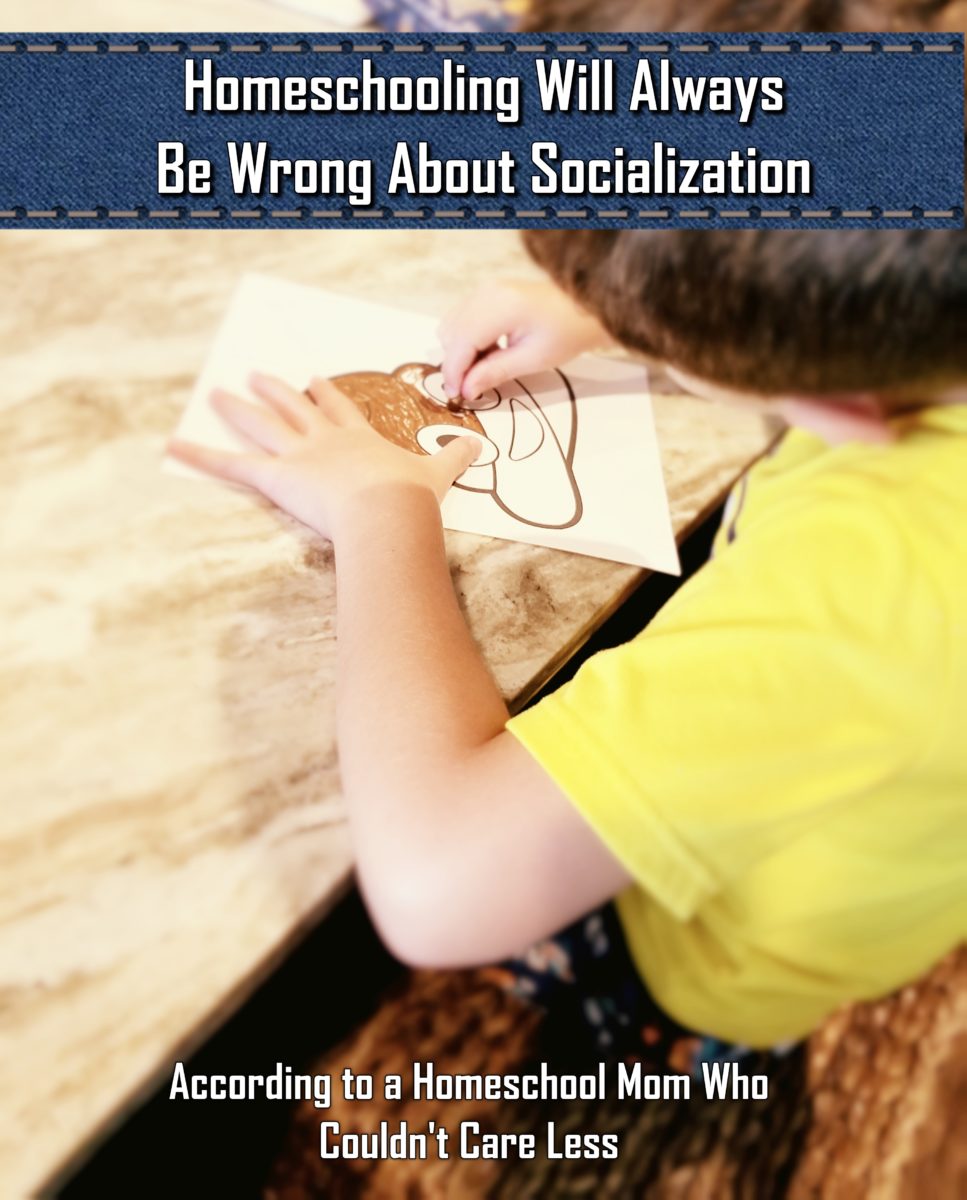
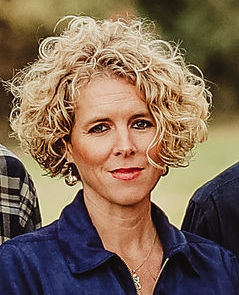


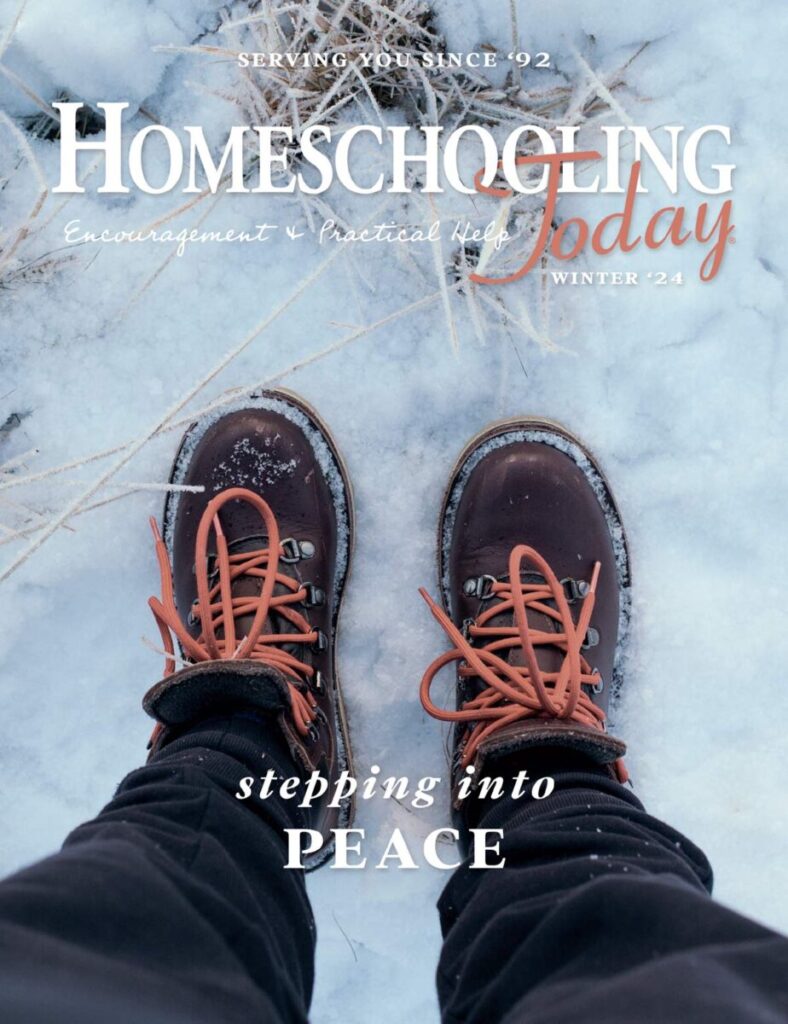

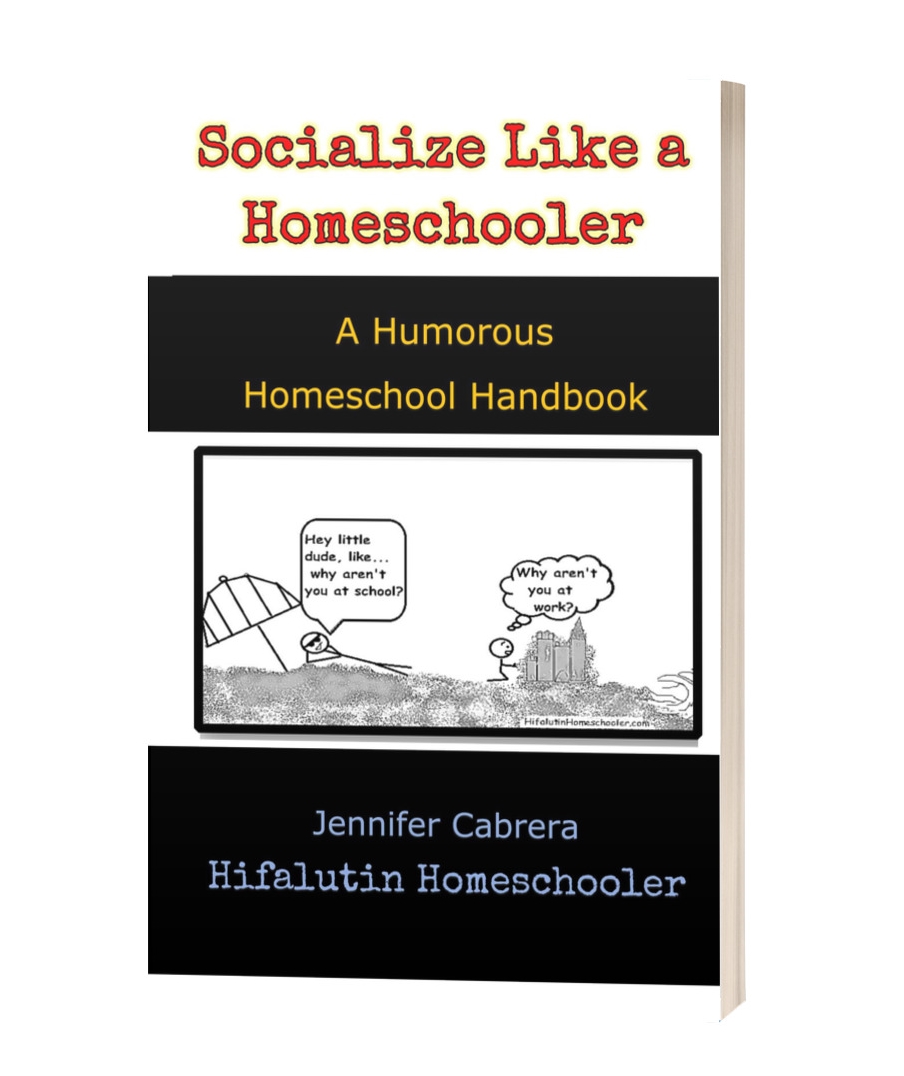

Thank you for taking the time to educate people because my daughter learned more by being Home schooled than she did in Public School and made better friends and had to deal with less drama.
100% support this truth. Who wouldn’t learn more- it’s individualized attention.
Who wouldn’t grow their own strengths better? You have the chance to focus truly on your child’s strengths.
Who wouldn’t fare better in socializing- do you really want to be comfortable and happy around everyone?- truth is none of us do.
And parents who have friends, take their children places, entertain in their home, and interact freely with others will bring their children along with them as they do these things.
That is the way socialization occurs.
Is it more important that the group finds me acceptable? Or more important that I am comfortable with who I am?- Then my natural relationships will happen.- I don’t want to be comfortable with those who are intentionally consistently unethical. Kind yes, compassionate – yes. But comfortable ? No.
Children need room to develop in private strength to refuse such things. Our homes should be the place where they can.
Wait, people were actually concerned about her write-up?? Ha!
I read it thought hmm…then decided it wasn’t worth my time. Your talking through her article made that decision more real
My daughter who was homeschooled K-12 was voted “Miss ____ University” and homecoming queen, graduated summa cum laud, and was voted the best all around student by the faculty at her college graduation. We were not very worried about socialization.
Well, I guess not! Congrats!
Thank you for the wonderful read. I also have to laugh at the socialization argument with most publicly schooled families. My thought is that given most home-schooled kids are out and about in the real world are actually more socialized than their peers at “school”
I love how you gave her the last word on the matter. Perhaps she’ll come around someday and realize homeschooling actually fits her stated ideals better than she ever imagined.
One can only hope. Even if I didn’t change her mind. Maybe I opened it a bit?
I really enjoyed reading this. I’m going to share it in my FB group.
“Homeschooling is alive and well, and still completely lacking in institutionally recognized methods of socialization.” Yes. Exactly. We recently did a podcast “Do You Even Know What Socialization Means?” kind of in response to another public school educator who has had a few former homeschooled students who were “lacking social skills”. Therefore, they have deemed that all homeschoolers need better socialization. We got a little fired up in our discussion and came to the conclusion that, as you stated, most people think that socialization can only happen in an institutional setting and are clueless as to what socialization really is!
And we don’t want to be right! Love your blog name, btw!
Great answers to this “old” question 🙂
Yeah! Thanks
I read her article and laughed when she talked about how one of the main drawbacks is that children only ever had to work with people they got on with – oh if only that were true! Has she ever heard of siblings! Mine are not always best friends and are completely different to each other, in strengths, personality and learning style. I think one of the main ways I have seen my children grow has been through having to work with their siblings rather than getting to work with the same couple of close friends they worked with in school. They have grown in patience, understanding and encouragement more in this past year of homeschool than in their 5, 3 and 1 year of public school. Their self-esteem and self-belief has also skyrocketed, which I has brought significant benefits to their friendships. It’s a real shame she believes her public school experience could ever give her the insight to right such an article.
Yes, siblings. It’s a real war sometimes. And I went back and forth about responding to her article because she clearly wasn’t speaking from experience. And I decided that needed pointing out.
Love this! Having graduated 3 and with 1 Senior in high school at home I always just chuckle at the socialization myth. I wish it would die an ugly death but so far it hasn’t. I have to say though at a recent college visit our homeschool senior wasn’t the one who was awkward on the department tour – rather it was the public schooled junior accompanying him, maybe because our son interacts with more than just people his age and hasn’t been told he’s odd for being a nerd?
“Die an ugly death” LOL!
Great thoughts. Also a thought for homeschooling parents…we don’t have to prove anything. If a child is socially awkward or a struggling learner that does not mean that homeschooling was a failed experiment. Research supporting measurable benefits is great, but every time we say, “Look my kid’s a genius,” there’s an implication that if a child is average or below average that you didn’t do it right. Homeschooling is the best option for our family; however, the benefits are not all quantifiable.
So true.
Wait, we get denim jumpers? Why has no one has provided me with my denim jumper! I feel so cheated…
I wouldn’t even know where to go buy one, honestly. I’m pretty sure it goes along with homeschool moms making all their children’s clothing. Out of curtains or something. I read it on the internet somewhere so it must be true.
I believe THST stereotype came straight out of the 80s/90s, when denim jumpers were actually fashionable (and when modern-day homeschooling was new). What I don’t understand is how the denim jumper is now associated only with those homeschoolers. Dude! Everyone wore them. Just look at any 80s sitcom!
Thank you for this article – which now pops up just below the popsugar.com article on Google searches, by the way. (Congrats on that!) I appreciate your sense of humor and it’s refreshing to see a homeschool Mom who is unapologetic in her discussions. Keep up the awesome work!
Oh wow! That is awesome to hear! Glad my response, on behalf of the homeschool crowd, is getting noticed.